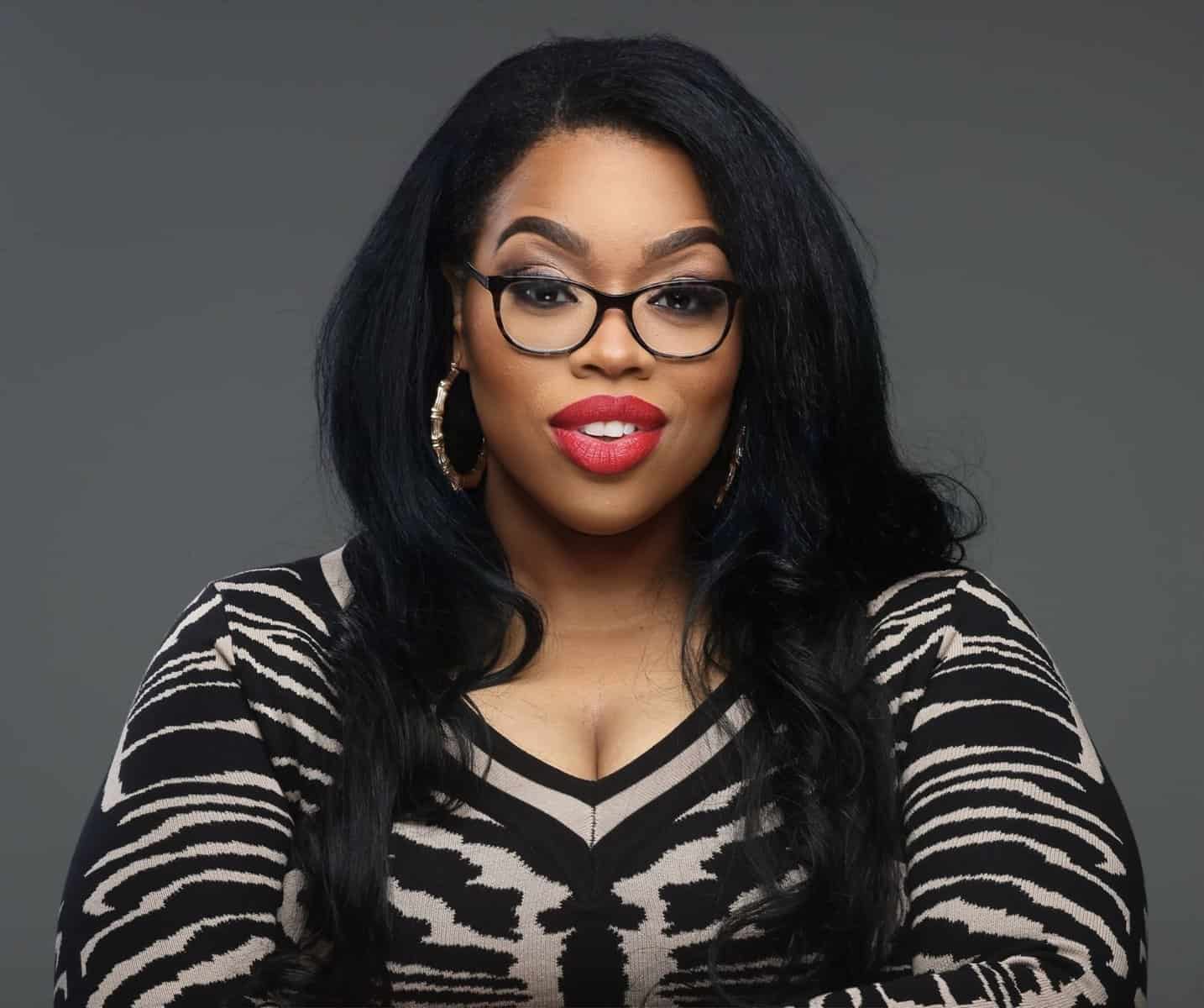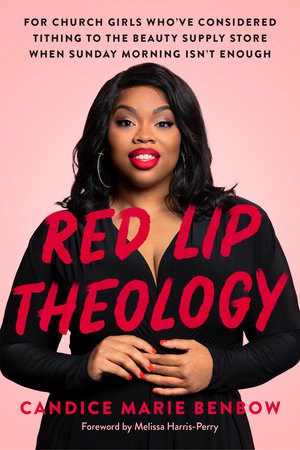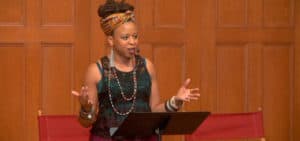 This month, we are introducing you to some incredible Black authors and thinkers who are helping us find a pathway to sustainable peace-building, ongoing reconciliation, and honest reflection. Today we talk with Candice Marie Benbow, a theologian, essayist, columnist, baker, and educator whose work gives voice to Black women’s shared experiences of faith, healing, and wholeness. Candice created the “Lemonade Syllabus” social media campaign, founded the media boutique Zion Hill Media Group, and, in memory of her mother, established The LouiseMarie Foundation to support HBCU nursing students and community mental health projects. Her new book, Red Lip Theology, is published by Convergent Books, a division of Penguin Random House.
This month, we are introducing you to some incredible Black authors and thinkers who are helping us find a pathway to sustainable peace-building, ongoing reconciliation, and honest reflection. Today we talk with Candice Marie Benbow, a theologian, essayist, columnist, baker, and educator whose work gives voice to Black women’s shared experiences of faith, healing, and wholeness. Candice created the “Lemonade Syllabus” social media campaign, founded the media boutique Zion Hill Media Group, and, in memory of her mother, established The LouiseMarie Foundation to support HBCU nursing students and community mental health projects. Her new book, Red Lip Theology, is published by Convergent Books, a division of Penguin Random House.
Many of us see faith as something that protects us from things of the world. How can our faith actually be a tool of transformation in how we see ourselves and others so that instead of moving inward, we see ourselves and the world with wonder and awe?
 Isn’t that what faith is already designed to do, though “we” have shifted it out of that space? When I think of faith, especially within a Christian context, I think of a love that radically entered into and shifted the entire world…and still found and finds time to care for/about me. That kind of care and intention can’t help but impact how you see yourself in and apart of the world around you.
Isn’t that what faith is already designed to do, though “we” have shifted it out of that space? When I think of faith, especially within a Christian context, I think of a love that radically entered into and shifted the entire world…and still found and finds time to care for/about me. That kind of care and intention can’t help but impact how you see yourself in and apart of the world around you.
Every day, my aim is to stay there: in the flow that, within this massive creation, there’s intentional concern for all of us, all living things and all inanimate objects. We matter that much to God, so we should matter that much to each other.
In your book you talk about heartache and loss. What does it look like for us to embrace the wounds of our past and present and to realize they can be tools to better love and relate to those around us?
Scripture says that we overcome by the blood of the lamb and the word of our testimony. To embrace our wounds is to embrace freedom. We can’t be healed until we admit what hurt us and what did not overtake us. Too often, I’ve watched us celebrate overcoming and healing but not wanting to be honest about what we healed from and overcame. That kind of truth-telling matters. It also makes us more empathetic and gracious.
We all have been wounded or wounded someone. In our brokenness, we’ve caused more brokenness. It matters that we learn to see each other through that space. It doesn’t mean you excuse harm or mistreatment. It does mean that you recognize the root of that harm and mistreatment because you had to work to deal with the root within you. If we are wedded to transformation, then it isn’t hard to embrace the pain and hurt in our lives. And I don’t mean embrace it in a “it needed to happen so I can grow” kind of way but in a “I open myself up to whatever transformation will take place as I work to heal from this.”
What does it mean to be a feminist today in a Christian context? Why must it be a key voice at the faith table?
I am a Black woman because it is the will of God for my life. As I show up in the world, I am in God’s will. Black feminism and womanism in a Christian context means advocating for a world that reflects how Black women and girls bear the image of God. So much of my work is grounded in that truth and the need to push communities and institutions, especially those grounded in faith, to recognize the work they need to do to be spaces of transformation and hope.
It means creating intersectional spaces and inroads that honor the truth of our experiences and naming racism, sexism and patriarchal forces as sin, because that’s exactly what they are. Feminism has to be an essential part of any faith discussion, because we all are impacted by faith and theological formation. What is taught is what we learn and replicate. The advocacy of women has to be front of mind for those who are willing to be a part of change.
What role does body positivity play in how we operate on a daily basis?
I know we live in a world where terms like “body positivity” rule the day and are seemingly the most effective ways we can offer up terms and concepts to the masses. I get that. And still, as a Black woman who is working to have a better relationship with my own body, I don’t know if “body positivity” is what I’m aspiring to live into. The ways body positivity function as a construct actually render the nuance needed for how I move and show up in the world null and void.
Ultimately, it’s so rooted in whiteness that it makes little to no room for me or others like me. So, actually, I wouldn’t say body positivity—as we know it—is part of Black women’s daily lived experience. For many of us, we’re trying to make it through the day in a body that has been rendered unlovable and undesirable no matter how much it has a desirable aesthetic. We’re trying to make space for ourselves in ways that aren’t already given to us and it can be painful. I want a world that makes room for all bodies, especially those that have been marginalized, to just be as they wish to be. I don’t necessarily see that as body positivity but as justice.
What is your call to action for all women (and men) who have felt marginalized and silenced in their faith communities?
I don’t have a call to action for the marginalized but an affirmation that I see and hear them. Their experiences matter, and however they choose to process and move beyond their experiences is valid and respected, because they should have never experienced that marginalization in the first place.
As an ethic, I try not to push folks who are on the underside of power to do anything. What they need more than marching orders are real advocacy and care. My call to action is for the faith communities and institutions who seek to silence and marginalize. It is imperative that they do the work to repent from the evils of oppression and injustice and actively work to be places that reflect God’s heart. The power and ability to do that work rests with them and them alone.


